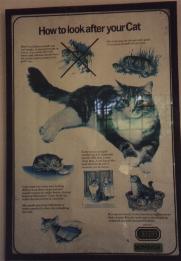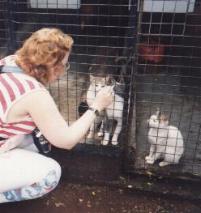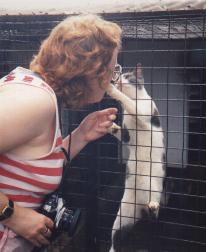KENYA SOCIETY FOR THE PROTECTION AND CARE OF ANIMALS
My trip to Kenya was not intended to be a fact-finding tour about moggies since hubby was thinking more in terms of lion-spotting. During the transfer between Mombasa airport and the hotel I noticed the KSPCA (Kenya Society for the Protection and Care of Animals) shelter. Despite having a lot to cram into a one-week holiday, I did manage a visit and learn a little bit about the KSPCA and the smaller, friendlier cats of Kenya!
Other holiday destinations had led me to expect all hotel cats to be sickly, and nervous with kittens in tow. I didn't expect Mombasa's hotel cats to be any different, but those at our hotel were well-fed, friendly and had names! They looked healthy apart from fleas and eczema and I was pleased to learn that they were neutered; the more timid ones having been ear-clipped for identification. Kenyan hotel cats are generally kept for vermin control, though many guests enjoy feline company and the staff didn't mind us feeding the cats. "Reef" was by far the friendliest and best fed hotel cat I have so far seen on my travels.

I visited the KSPCA's Mombasa shelter two days into the holiday. There are only 2 KSPCA branches - the one in Mombasa and a larger branch in Nairobi. The Mombasa shelter is close to Bombolulu on the Nyali Road. I thought my request to visit the KSPCA might seem eccentric in a country where most tourists head for the National Parks and are more interested in lions, leopards and cheetahs than moggies! The taxi driver assured me that many European tourists, especially the English, asked to visit the KSPCA.
At the shelter, we were greeted by several friendly dogs and four grubby but happy six week old kittens which seemed to have the run of the KSPCA office building. The two staff, both Kenyan, were more than happy to show me round and tell me about the KSPCA. Donations from visiting tourists form an important part of their income in a country where domestic animals do not feature high on the list of priorities.
There is a mixture of Christianity, Islam and indigenous religion in Kenya and this affects animal care. Muslims do not generally believe in euthanasia because only God has the right to decide when an ill or injured animal dies. Some Muslims are not comfortable about neutering/spaying for religious reasons, although there is no specific prohibition and the necessity of neutering is generally accepted. Most Christians have no religious arguments against euthanasia or neutering. When working in animal welfare and trying to educate owners, it is necessary to be aware of any religious restrictions.
BACK TO BASICS

The cat pens form a small block behind the KSPCA office; compared to British catteries they were basic with a small shed-section and a concrete front run which was hosed down daily. Car tyres with blankets draped over them made draught free cat beds (an idea which could be useful for farm or factory ferals here). The pens had dirt trays and also pieces of log for claw-stropping. Unlike most British shelters there were no 'sneeze barriers' between the pens. Each pen contained two or three adult cats, all sleek, fit and friendly.
With proprietary pet foods being largely unavailable or prohibitively expensive, the cats' diet comprises minced meat which is kept in a freezer in the office. Such a diet is not ideal on a long-term basis, but is affordable for the cats during their stay at the shelter. The time taken to rehome a cat is "very variable" and in general, Kenyan cats are functional rather than pets. All of the feline inhabitants looked well cared for and content even if the cattery didn't meet FAB (UK Feline Advisory Bureau - the "gold standard" for UK catteries) standards.

The KSPCA staff were knowledgeable about the common cat ailments. A number of the cats at the shelter had sniffles or runny eyes, but were obviously not in any distress. It is important to remember they are not pampered or over-protected like many of our own adored pets, and most show signs of 'reasonable wear and tear'. Vaccinations for cat flu and enteritis are available, but expensive and the staff told me that enteritis is sometimes a problem. Skin cancer was also now being noticed in pale-eared cats; not entirely unexpected so close to the equator. Rabies was not found to be a problem in the Mombasa area.
All adult cats homed by the KSPCA are sterilized (neutered) and anyone adopting a kitten must promise to have it sterilized once it is old enough. At the time of my visit, it cost around 1500 Kenyan shillings (£18) for a castration and 2500 Kenyan shillings (£30) for a spaying. Compared to the average income of a family sterilization is prohibitively expensive. Kittens could be acquired in Mombasa market for only a few Kenyan shillings each and were often sold while far too young.
Cats are mostly kept to kill mice and rats. The only people who keep cats and dogs purely as pets tend to be European families living in Kenya. As well as giving owners advice about looking after their cat, the staff do home checks although their criteria are more basic than those applied by CPL shelters. The cat cannot expect a life of luxury, but must receive proper care including vet care and neutering. "The Manager" and her colleagues certainly didn't seem to be doing too badly on the "basic care" front!
NOT AN EASY LIFE IN PARADISE

In Britain, few creatures regularly prey on cats. In Kenya, a cat's life is a lot harder. Snakes which prey on mice and rats will also take unwary or unguarded kittens. Birds such as the Indian House Crow (considered a nuisance) will attack undefended kittens. Cat flu and enteritis adds to the mortality rate. Shelter staff told me that ferals were not perceived to be a problem, though they did trap, neuter and ear-clip hotel cats which was why Reef and her feline friends looked so healthy compared to other hotel cats I have seen.
I saw very few ferals in Mombasa. Mombasa town has relatively few 'tourist' cafes which attract ferals in other holiday destinations so strays and ferals are less visible to tourists. There must have been strays around, especially near the marketplace, but wherever they were they stayed out of sight.
The KSPCA does trap strays for rehoming or, in the case of resort cats, for neutering and return. They use the familiar automatic metal traps which are supplied to them by the RSPCA. The KSPCA has good links with the RSPCA and RSPCA cat care posters are prominently displayed around the office along with Cat Action Trust "Stitch in Time" posters. Many of the posters and leaflets at the shelter come from British animal charities and were sent by tourists who visited the shelter while on holiday.
Where cats live in remote villages there are other problems - firstly cats may be regarded as snack food by lions and other carnivores and secondly, cat flu is transmissible to large cat species with potentially lethal results.
A BRIEF WORD ON DOGS
Though my main interest was in the cat side of the KSPCA 'pet' work, I know that many cat owners are also dog owners and many readers are interested in animal welfare in general. Cats are far more fortunate than dogs, which are are viewed as unclean by devout Muslims (dogs will eat faeces and male dogs cock their legs everywhere). Dogs are in demand as guard dogs and many Muslim families hire a servant to care for the dog so that the owner doesn't have to touch it himself. I saw a dead dog in a Mombasa street; most of the locals took great care to give the unclean animal a wide berth.
The KSPCA vet the home of prospective dog-owners and do a follow-up check after 3 months; as long as the dog has a sleeping area, food and water it is better off being a guard dog than being in a cage. Very few families, apart from European families living in the area, wanted dogs as pets. As in other parts of Africa, it is necessary to vaccinate dogs, especially those which live in close proximity to lions, jackals etc. Domestic dogs harbour a number of diseases (particularly distemper) and parasites which can affect African wildlife.
HELPING THE KSPCA
The KSPCA welcomes support from visitors e.g any spare Kenyan currency at the end of your holiday, copies of cat/dog magazines and also cat/dog care leaflets (for handing out). You can send donations, made out in Kenyan Shillings, to KSPCA, PO Box 80379, Mombasa, Kenya or KSPCA, PO Box 24203, Nairobi, Kenya. Visiting vets who wish to donate their services (e.g. for trap-neuter-release schemes) or veterinary items should contact the KSPCA for further information.